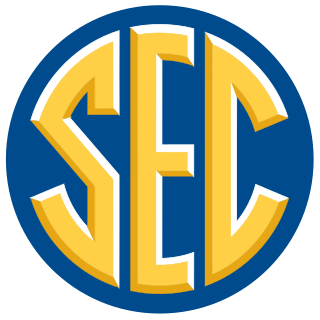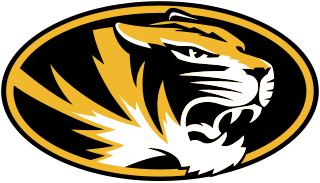Related Research Articles

The Big Ten Conference is the oldest NCAA Division I collegiate athletic conference in the United States. Founded as the Intercollegiate Conference of Faculty Representatives in 1896, it predates the founding of its regulating organization, the NCAA. It is based in the Chicago area in Rosemont, Illinois. For many decades the conference consisted of ten prominent universities, which accounts for its name. On August 2, 2024, the conference will expand to 18 member institutions and 2 affiliate institutions. The conference competes in the NCAA Division I and its football teams compete in the Football Bowl Subdivision (FBS), formerly known as Division I-A, the highest level of NCAA competition in that sport.

The Big 12 Conference is a college athletic conference headquartered in Irving, Texas. As of July 2024, it consists of 12 full-member universities in the states of Florida, Iowa, Kansas, Ohio, Oklahoma, Texas, Utah, and West Virginia.

The Mountain West Conference (MW) is a collegiate athletic conference located in the United States, participating in NCAA Division I. Its football teams compete in the Football Bowl Subdivision (FBS). The MW officially began operations on January 4, 1999. Geographically, the MW covers a broad expanse of the Western United States, with member schools located in California, Colorado, Idaho, Nevada, New Mexico, Utah, and Wyoming, as well as an associate member in Hawaii. Gloria Nevarez took over as Commissioner of the MW on January 1, 2023, following the retirement of founding commissioner Craig Thompson.

The Southeastern Conference (SEC) is an American college athletic conference whose member institutions are located primarily in the South Central and Southeastern United States. Its sixteen members include the flagship public universities of twelve states, three additional public land-grant universities, and one private research university. The conference is headquartered in Birmingham, Alabama. The SEC participates in the National Collegiate Athletic Association (NCAA) Division I in sports competitions; for football it is part of the Football Bowl Subdivision (FBS), formerly known as Division I-A.

The Cotton Bowl Classic is an American college football bowl game that has been held annually in the Dallas–Fort Worth metroplex since January 1, 1937. The game was originally played at its namesake stadium in Dallas before moving to Cowboys Stadium in nearby Arlington in 2010. Since 2014, the game has been sponsored by the Goodyear Tire and Rubber Company and officially known as the Goodyear Cotton Bowl Classic; it was previously sponsored by Mobil (1989–1995) and Southwestern Bell Corporation/SBC Communications/AT&T (1997–2014).

The Big Eight Conference was a National Collegiate Athletic Association (NCAA)-affiliated Division I-A college athletic association that sponsored football. It was formed in January 1907 as the Missouri Valley Intercollegiate Athletic Association (MVIAA) by its charter member schools: the University of Kansas, University of Missouri, University of Nebraska, and Washington University in St. Louis. Additionally, the University of Iowa was an original member of the MVIAA, while maintaining joint membership in the Western Conference.

The Southwest Conference (SWC) was an NCAA Division I college athletic conference in the United States that existed from 1914 to 1996. Composed primarily of schools from Texas, at various times the conference included schools from Oklahoma and Arkansas.

The Missouri Tigers intercollegiate athletics programs represent the University of Missouri, located in Columbia. The name comes from a band of armed Union Home Guards called the Fighting Tigers of Columbia who, in 1864, protected Columbia from Confederate guerrillas during the American Civil War.
College football on television includes the broad- and cablecasting of college football games, as well as pre- and post-game reports, analysis, and human-interest stories. Within the United States, the college version of American football annually garners high television ratings.

The 2007 Texas Longhorns football team represented the University of Texas at Austin in the 2007 NCAA Division I FBS football season. The team was coached by Mack Brown. The Longhorns played their home games in Darrell K Royal–
The 2007 Phillips 66 Big 12 Men's Basketball Championship was the 2007 edition of the Big 12 Conference's championship tournament held at the Ford Center in Oklahoma City from March 8 until March 11, 2007. The tournament ended in an 88–84 overtime victory by the #1 seed Kansas Jayhawks over the #3 seed Texas Longhorns, and was the first Big 12 tournament ever to end in an overtime game.
The NCAA Division I Football Bowl Subdivision (FBS), formerly known as Division I-A, is the highest level of college football in the United States. The FBS consists of the largest schools in the National Collegiate Athletic Association (NCAA). As of the 2024 season, there are 10 conferences and 134 schools in FBS.
William Mack Brown is the former head coach of the University of Texas Longhorn football team. During his tenure, the Texas Longhorns football team under Mack Brown had a winning record in 15 of 16 seasons.
The 2010 Nebraska Cornhuskers football team represented the University of Nebraska in the 2010 NCAA Division I FBS football season. The team was coached by Bo Pelini and played their home games at Memorial Stadium in Lincoln, Nebraska. They were members of the North Division of the Big 12 Conference. It was Nebraska's 102nd and last season in the Big 12 as they began competing in the Big Ten Conference in 2011.
The Big 12 Network was a syndicated package featuring live broadcasts of College basketball events from the Big 12 Conference that was broadcast under that branding from 2008 until 2014. It was owned and operated by ESPN Plus, the syndication arm of ESPN, Inc., and was mainly shown in areas in the Big 12’s geographical footprint, along with other areas of the United States. Games were shown locally on broadcast stations, regional sports networks, as well as on ESPN Full Court, and WatchESPN.
A superconference is an athletic conference noted for its large number of members, significant revenue generation, and substantial power that it wields in comparison to at least some of its counterpart conferences. The term is typically used in reference to college athletics in the United States. Because superconferences are emergent and not clearly defined, the term is often used in a hypothetical and speculative way, although one definition of American college superconferences posits that they must form from leagues that were Automatic Qualifying (AQ) conferences during the era of the now-defunct Bowl Championship Series, possess a significant multi-network television deal, and at least consider expanding to the "magic number" of 16 members. The term, though used infrequently before 2010, has historical roots in the proposed "Airplane Conference" of 1959, the Metro Conference's 1990 plan to expand to 16 members, the expansion of the Western Athletic Conference (WAC) to 16 members in 1996, and the creation of 12-team, two-division conferences with football championship games by the Southeastern Conference (SEC), Big 12 Conference, and Atlantic Coast Conference (ACC) in the 1990s and 2000s. Since major conference realignment began in 2010, the term has been used to describe the expanding ACC, Big 12, Big Ten, Pac-12, and SEC conferences.
Longhorn Network (LHN) was an American regional sports network owned as a joint venture between The University of Texas at Austin, ESPN and Learfield, and was operated by ESPN. The network, which launched on August 26, 2011, focused on the Texas Longhorns varsity sports teams of the University of Texas at Austin, and broadcast programs such as pre- and post-game shows, event replays, coach's shows, original series and documentaries chronicling the Longhorns and their history, and live coverage of Longhorns events not carried by other Big 12 Conference media partners.

The 2010–12 Southeastern Conference realignment refers to the Southeastern Conference (SEC) dealing with several proposed and actual conference expansion and reduction plans among various NCAA conferences and institutions. Moves that involved the SEC were a relatively small part of a much larger NCAA conference realignment that began in the 2010–11 academic year and continued through the first half of 2014. The SEC was one of the least impacted conferences, as no member schools announced plans to join other conferences, while two schools from the Big 12 Conference joined the conference as all-sports members. Several other schools have been rumored as potential expansion candidates.

The 2010–2013 Big 12 Conference realignment refers to the Big 12 Conference dealing with several proposed and actual conference expansion and reduction plans among various NCAA conferences and institutions. Part of a larger NCAA conference realignment that began in the 2010–11 academic year and continued through 2013–14, the Big 12 was one of the more severely impacted conferences. In all, four schools left during this cycle and two joined.
The Big 12 Conference is a fourteen-school collegiate athletic conference headquartered in Irving, Texas. The Big 12 is a member of the Division I of the National Collegiate Athletic Association (NCAA) for all sports. Its football teams compete in the Football Bowl Subdivision, the higher of two levels of NCAA Division I football competition. Member schools are located in Florida, Iowa, Kansas, Ohio, Oklahoma, Texas, Utah, and West Virginia.
References
- ↑ "Crisis brought out the best in the Big 12's Beebe | Dallas-Fort Worth College Sports News - Sports News for Dallas, Texas - SportsDayDFW". Dallasnews.com. 2010-08-29. Retrieved 2011-12-15.
- ↑ Wieberg, Steve (2011-09-22). "Big 12 seeks reforms to ensure stability as Beebe departs". USA Today . Retrieved 1 January 2012.
- 1 2 3 4 "SoonerFamily • View topic - Dan Beebe named Big 12 Conference Commissioner". Soonerfamily.com. Retrieved 2011-12-15.[ permanent dead link ]
- ↑ "University of Texas, ESPN join forces on Longhorn network - ESPN". ESPN. 2011-01-19. Retrieved 2011-12-15.
- ↑ "Dan Beebe out as Big 12 commissioner - Houston Chronicle". Chron.com. 2011-09-23. Retrieved 2011-12-15.
- ↑ Russo, Ralph D. (2011-10-09). "Dan Beebe says Big 12 now taking steps he touted". Washington Times. Retrieved 2011-12-15.